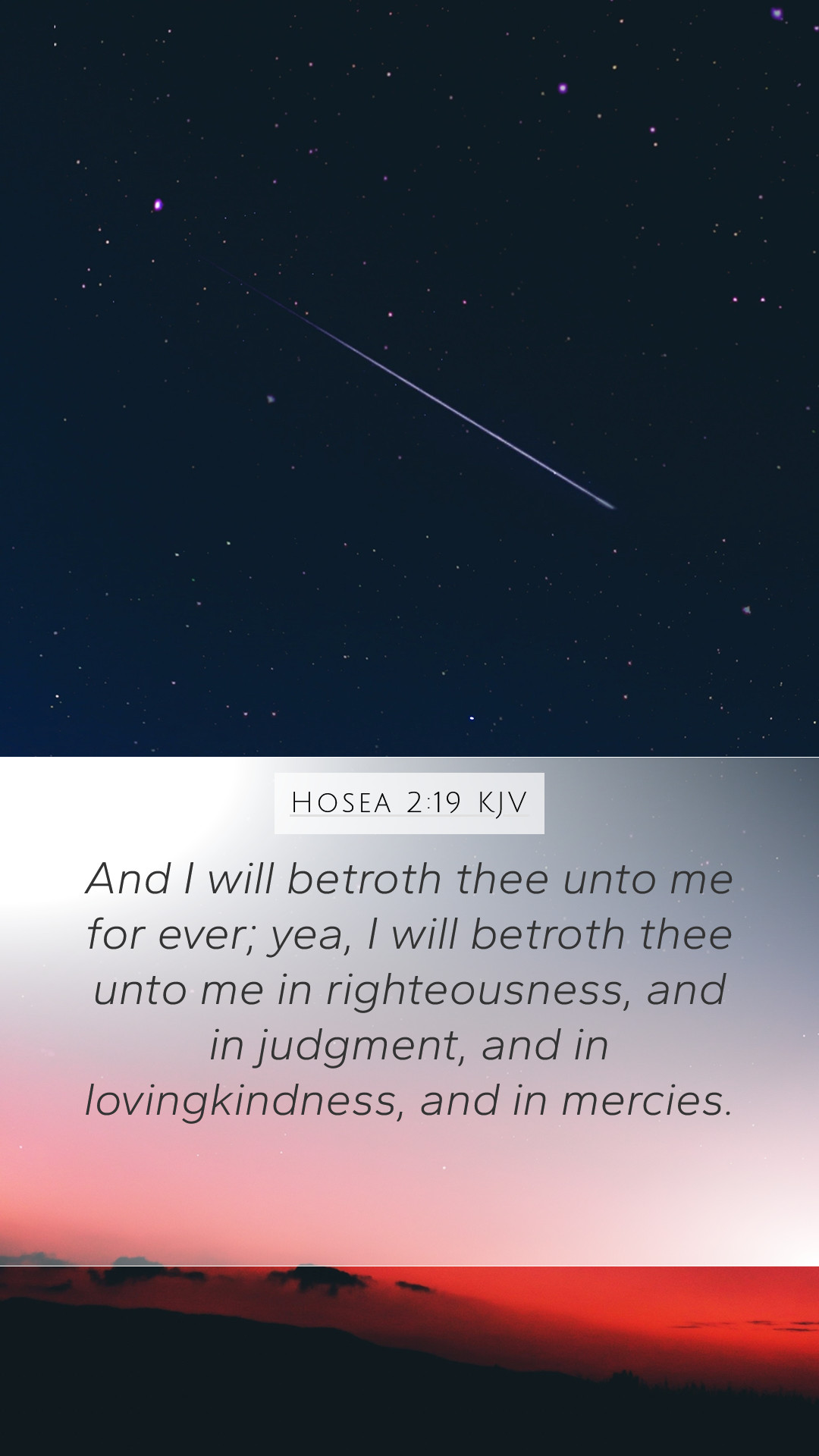Old Testament
Genesis Exodus Leviticus Numbers Deuteronomy Joshua Judges Ruth 1 Samuel 2 Samuel 1 Kings 2 Kings 1 Chronicles 2 Chronicles Ezra Nehemiah Esther Job Psalms Proverbs Ecclesiastes Song of Solomon Isaiah Jeremiah Lamentations Ezekiel Daniel Hosea Joel Amos Obadiah Jonah Micah Nahum Habakkuk Zephaniah Haggai Zechariah MalachiHosea 2:19 Meaning
What is the meaning of Hosea 2:19?
And I will betroth thee unto me for ever; yea, I will betroth thee unto me in righteousness, and in judgment, and in lovingkindness, and in mercies.
Hosea 2:19 Bible Verse Meaning
Understanding Hosea 2:19: A Comprehensive Bible Verse Commentary
Hosea 2:19 states: "And I will betroth thee unto me forever; yea, I will betroth thee unto me in righteousness, and in judgment, and in lovingkindness, and in mercies." This passage offers profound insights into God's intentions and the nature of His relationship with humanity, particularly Israel. In this summary, we gather interpretations from several public domain commentaries to provide a deeper understanding of this significant verse.
General Overview
This verse highlights God's commitment to His people, described through the metaphor of betrothal—a deeply intimate and binding relationship. Hosea conveys God's promise to Israel, representing His steadfast love and righteousness.
Exegesis and Interpretation
- Matthew Henry's Commentary:
Matthew Henry points out that this verse signifies the covenant relationship God seeks with His people. He emphasizes that God's betrothal indicates a deep personal bond, one that incorporates not only affection but also righteousness and mercy. Henry notes that this commitment is unparalleled, established on divine love and justice that lasts eternally.
- Albert Barnes' Notes:
Barnes highlights the contrast between Israel's past unfaithfulness and God's unwavering faithfulness. He elaborates that the 'betrothal' referred to here symbolizes God's restoration of a broken relationship due to Israel’s sin. This reconciliation is characterized by an active and faithful commitment from God, marked by righteousness and love, indicating a restoration of the divine covenant.
- Adam Clarke's Commentary:
Clarke elaborates on the implications of the term 'forever,' stressing the eternal nature of the relationship God establishes with His people. He explains that the terms 'righteousness, judgment, lovingkindness, and mercies' reflect the attributes of God that underpin this new covenant. Clarke’s insights remind us of God’s holistic approach to the relationship—encompassing justice, love, and compassion.
Theological Insights
The implications of this verse extend beyond its immediate context, offering vital theology for believers. The betrothal metaphor signifies not only a promise of future stability and blessing but also a present call to live righteously as a response to God's love. Each attribute mentioned—righteousness, judgment, lovingkindness, and mercy—challenges the believer to reflect those qualities in their relationships with one another.
Application of Hosea 2:19
To apply this verse to daily life, one must focus on the covenant relationship established by God. Consider the following:
- Commitment: Reflect on personal commitments to God and others, fostering fidelity in relationships.
- Living Righteously: Strive to embody the attributes of righteousness and lovingkindness in everyday actions.
- Understanding Forgiveness: Recognize and accept the mercies of God, leading to a more forgiving attitude towards others.
Cross References
This verse resonates with various other scriptures that underscore God's covenantal promises:
- Jeremiah 31:31-34: The promise of a new covenant.
- Ezekiel 36:26-28: God's promise of a renewed heart.
- Isaiah 54:5: The nature of God as a husband to His people.
Conclusion
Hosea 2:19 serves as a profound reminder of God's unyielding commitment to His people, characterized by love, righteousness, and mercy. As we dive into the interpretations and commentaries provided, we gain a richer understanding of this verse, equipping us for deeper Bible study, enriching our faith, and fostering genuine connections within our communities.
Further Study Resources
For those interested in deeper exploration, consider engaging with:
- Bible study guides focused on the prophetic books.
- Online Bible study platforms for collaborative learning.
- Historical context resources that examine the time of Hosea.


